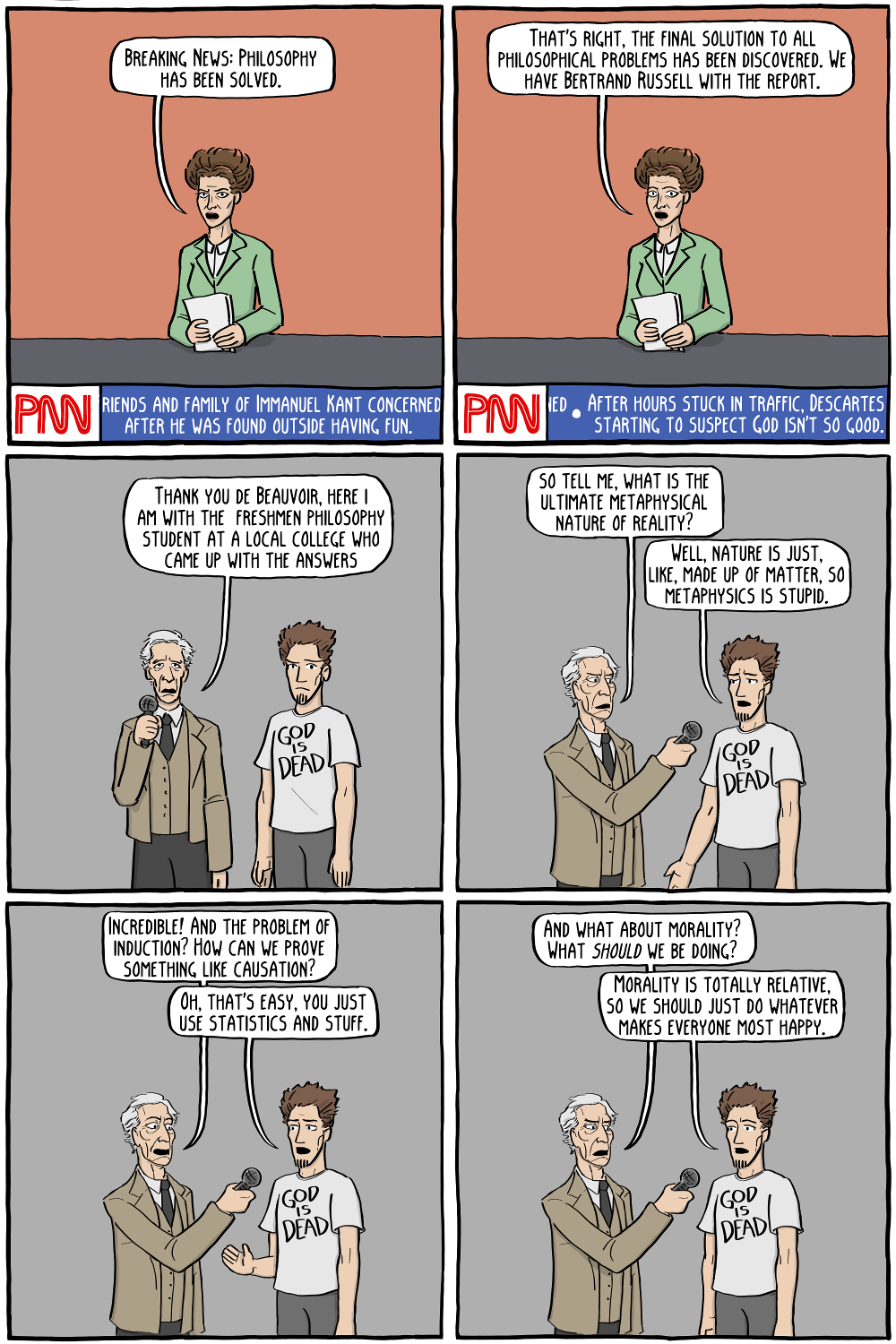
Note that on the one hand, I agree substantially with Atheist Freshman Philosophy Student: the world really is matter (but quantum mechanics shows us that matter is really quite complicated and strange), statistics and good experimental design gets us as close to "proving" causality as we want, and morality really is relative (to our subjective feelings), and a robust version of utilitarianism really is the best we can do as a socially constructed morality. And there are indeed no gods.
If the goal of philosophy really is to find out the true nature of physical reality and the best socially constructed morality, then yes, the problems of philosophy have been "solved". In much the same sense, the problem of the planets moving around all higgledy-piggledy was "solved" by Newton. Yay!
(I disagree with the character of Bertrand Russell: I don't think AFPS says anything fundamentally contradictory; I think any apparent contradictions come only from an uncharitable reading of ambiguous language.)
I think there are no small few philosophers who do see the above as the goal of philosophy, whom the author brilliantly satirizes in the final two paragraphs.
But I think I might agree with the author, in the sense that I don't think the goal of philosophy really is to find out the true nature of physical reality. All I can give you is my semi-informed opinion, but that opinion is that philosophy is a literary genre, and is a part of the search for truth in precisely the same sense that literature in general is a part of the search for truth. And that ain't chopped liver.
Take any great work of fiction, from Gilgamesh or the Iliad to The Sellout. Clearly (or so we assume) the actual events in a work of fiction are not literally true. And great works of fiction seem to interact with the truth-seeking parts of our minds in ways that lesser works of fiction do not. Thus too for philosophy. Plato is still worth reading even if his Theory of Forms is not literally true, and Plato is still worth reading not because his work is entertaining (which it is, notwithstanding his literary flaws, Plato is a rather good writer, especially in The Republic), but because he seems to interact with the truth-seeking parts of our minds.
I think it's pointless to argue about the underlying value philosophy. You either like philosophy or you don't. I don't care about the aesthetic or emotional problems that medieval French poetry addresses, I don't care about the poets' solutions to those problems, so I don't even read, much less study, medieval French poetry. It's useless to me personally, but if you like it, knock yourself out. But if you tell me I am an incomplete or unworthy human being just because I don't study medieval French poetry, make a damn good case or go fuck yourself.
Thus too with philosophy. As a literary endeavor, philosophy doesn't need to justify itself scientifically, any more than Plato needs to establish that Phaedrus was an actually existing person, and that his conversation with Socrates actually happened for the Dialog to be valuable. And that Richard Dawkins or Neil deGrasse Tyson does not find philosophy valuable should have no more import to philosophers than my indifference should have to scholars of medieval French poetry.
No comments:
Post a Comment
Please pick a handle or moniker for your comment. It's much easier to address someone by a name or pseudonym than simply "hey you". I have the option of requiring a "hard" identity, but I don't want to turn that on... yet.
With few exceptions, I will not respond or reply to anonymous comments, and I may delete them. I keep a copy of all comments; if you want the text of your comment to repost with something vaguely resembling an identity, email me.
No spam, pr0n, commercial advertising, insanity, lies, repetition or off-topic comments. Creationists, Global Warming deniers, anti-vaxers, Randians, and Libertarians are automatically presumed to be idiots; Christians and Muslims might get the benefit of the doubt, if I'm in a good mood.
See the Debate Flowchart for some basic rules.
Sourced factual corrections are always published and acknowledged.
I will respond or not respond to comments as the mood takes me. See my latest comment policy for details. I am not a pseudonomous-American: my real name is Larry.
Comments may be moderated from time to time. When I do moderate comments, anonymous comments are far more likely to be rejected.
I've already answered some typical comments.
I have jqMath enabled for the blog. If you have a dollar sign (\$) in your comment, put a \\ in front of it: \\\$, unless you want to include a formula in your comment.
Note: Only a member of this blog may post a comment.